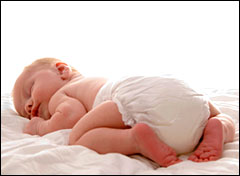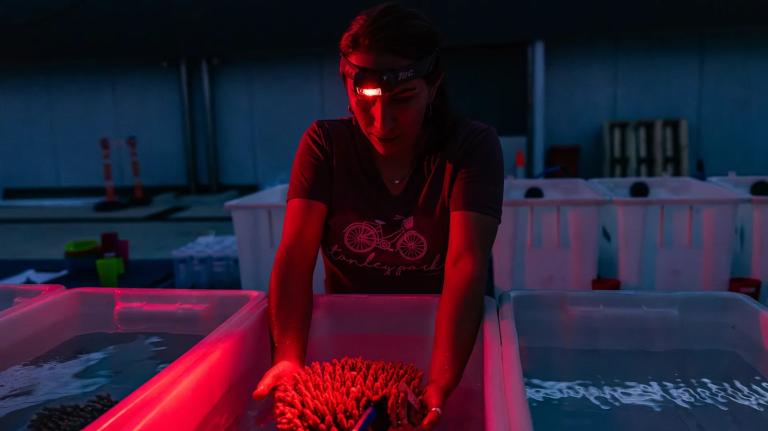My Sweet Umbra,
The diaper debate continues! I’ve read Grist’s position, and I even saw the same answer posted in your FAQs, which means I’m not supposed to be asking you about it again (all change has been effected by those of us who challenge the system!). The thing is, I disagree vehemently with your assertion that cloth diapers are as evil as disposables, and here’s why: We use organic cotton diapers on our daughter. Sustainably harvested, pesticide-free, unbleached cotton. I bought them from a local vendor to support my local businesses. I also use diaper covers made from wool, which I made sure was sustainably harvested. When they get pooped in, I have a handheld bidet, which uses a mere 0.75 gal/min of water, to conveniently wash said poop into the toilet, where it may or may not be flushed immediately … When I have a full load, I wash them in a high-efficiency front loading washer using vinegar, Biokleen, and a dash of Seventh Generation lavender scented detergent. When the wash is done, they get hung on the line (summer) or on the drying horse (winter), as does all of our laundry.
If we were using a diaper service, I would feel just as dirty about it as throwing masses of feces-filled disposables into the trash. But by doing it the way we have chosen (which is the way my mother did it, and her mother, and …), we avoid the emissions from transporting via the service, we use a very small amount of water, we don’t use harsh chemicals, and we don’t use any extra energy in drying them. I would argue until the diapers are dry that this method is far better than using disposables or a commercial diaper service, and really adds no more stress or work than doing laundry ever did in the first place. Rebuttals?
Ian
Hudson, Wis.
Dearest Ian,
Your letter was the shorter of two very long, impassioned letters from cloth-diaper supporters that I received recently. To be fair I will mention the main additional argument from the other, longer letter: We don’t use disposable clothing, so why use disposable diapers? Indeed. But diapers are more akin to toilet paper than they are to coats, and few suggest using reusable toilet paper.

Give it a rest.
The most recent large-scale study of diapers came out in 2005 — it was actually a study of nappies, as it came from the British Environment Agency. The agency commissioned a lifecycle assessment of the three major types of nappy: disposable, home-laundered cloth, and commercially laundered cloth. They considered a boggling range of factors, including estimates of infant urine production as well as factors such as the typical dryer electric load and the impact of woven fabric manufacture. They assessed impacts on global warming, ozone depletion, summer smog, depletion of non-renewable resources, eutrophication, acidification, human toxicity, and aquatic and terrestrial toxicity.
Despite what looks to me like a Herculean effort, the results were the same as previous studies. I quote, “For the three nappy systems studied, there was no significant difference between any of the environmental impacts … although the lifecycle stages that are the main source for these impacts are different for each system.” And, very helpfully, “For one child, over two and a half years, these impacts are roughly comparable with driving a car between 1,300 and 2,200 miles.” Now we know exactly how much mileage to shave off our car to compensate for diapering each kid.
There are a few ways for the typical layparent to integrate this type of LCA result into his or her life. One is to disbelieve the LCA and seek holes or errors in the system. I recommend against this stressful exercise (though it may be possible to find things you consider to be holes, as others did — too few nappies studied, your particular type of nappy not included, etc.). The other is to recognize that the LCA might be basically accurate, and that our reaction to it demonstrates where our passions lie.
I, for example, am relieved by this type of conclusion from a study. First of all, nearly everyone uses disposable diapers at one point or another. In the U.K., disposables are 95 percent of the diaper market. Imagine how depressing and horrid it would be to know that disposable diapers were clearly far worse than the alternative, but to see your friends, neighbors, fellow parents, and co. blithely continue to buy them. Second of all, what relief to choose a diaper based on what works best for our families and know that we have not compromised too much on the environment. We don’t get to do that with very many objects. You, Ian, have a passion for reusable diapers. How great, then, that this study shows your choice to be equal to other choices, rather than inferior.
I truly recommend a little reading through the nappy LCA. If you’ve never read an LCA, it will show how many factors go into making a thorough evaluation, and the uncertainty of various data (e.g., “There was limited amount of data regarding the quantities of excreta that are generated by children”). An LCA, because it finds the true impacts of a product, can help us know how to focus our efforts on environmental friendliness. Commercially laundered diapers require a large electricity use. Users of home-washed reusable diapers can reduce impacts by reducing energy use in washing and drying. For disposables, the main impacts are in manufacture of the materials and production of the diaper.
Given an equal diaper playing field, and given our inherent diapering prejudices, anything we can do to improve our diapering is good. You, Ian, are an illustration of how to improve the footprint of diapering choices. If the basic diapering choices are all the same planet-wise, then buying organic cotton, eschewing PVC wraps, and line-drying our diapers is clearly an improvement over the basics. In that regard, we can say yes, your particular habits are better than the typical diaper habit. How wonderful!
But what is the best thing we can do in terms of diapering, according to this advice columnist? Treat diapers as we would any laundry or paper product: Look for unbleached, organic, or recycled content; wash with cold water and less-toxic detergent if we are using cloth; and use less (ha!).Then stop worrying about diapers and look toward reducing our overall parenting carbon footprint in other areas. Having a kid adds miles to our cars and to our frequent flier accounts, increases our heating bill and water use, adds another probable meat-eater to the planet, and makes us use our electric appliances with fervor. There are many areas for clear improvement and urgent action as parents. Wouldn’t it be a relief to lay down this one parenting worry? I plead with you all to set diaper obsession aside until we learn new information.
Nappily,
Umbra


